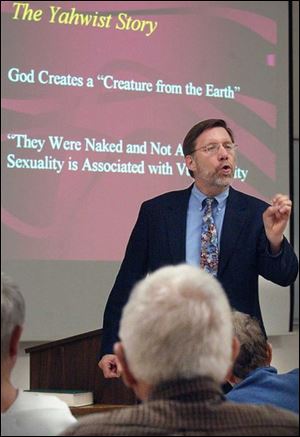
Theologians see significance in limbo statement
5/5/2007
Bacik
lisa dutton / blade

Bacik
A Vatican committee's recent document rejecting the concept of limbo is significant even though limbo never was an official teaching of the Roman Catholic Church and does not appear in the Bible, according to local theologians.
The International Theological Commission, in its 41-page report titled "The Hope of Salvation for Infants Who Die Without Being Baptized," overturned the medieval concept that unbaptized babies go to an eternal place of "natural happiness" called limbo.
Christian debate over the fate of unbaptized infants dates back to at least the fifth century, when St. Augustine of Hippo said they go to hell upon death, although they did not suffer in the worst part of hell, according to the Rev. James Bacik, a theologian and pastor of Toledo's Corpus Christi University Parish.
By the Middle Ages, St. Augustine's declaration had been softened by the concept of limbo, in which unbaptized infants went to a permanent place that gave them "natural happiness" but was not heaven, nor was it hell.
Now the International Theological Commission is saying that limbo is not necessary and that Catholics can believe that unbaptized children can go directly to heaven.

Gaillardetz
The report would never have been published without the implicit approval of Pope Benedict XVI and the Vatican's Congregation for the Doctrine of the Faith, according to Richard Gaillardetz, professor of Catholic studies at the University of Toledo.
Father Bacik said the latest ITC document is consistent with a movement within Catholicism toward "a greater salvation optimism," as defined by the Second Vatican Council 40 years ago.
Vatican II "made it clear that really it was the conscience that was the thing that would dictate whether people are saved or not," said Father Bacik, a graduate of Oxford University.
He cited Article 16 of Lumen Gentium, one of the principal documents of Vatican II, which says: "Nor does divine providence deny the help necessary for salvation to those who without blame on their part have not arrived yet with an explicit knowledge of God, but who strive to live a good life thanks to his grace."
That is consistent with the Bible, he said, citing 1 Timothy 2:4: "God wills the salvation of all people."
Mr. Gaillardetz also believes the new view of limbo is an extension of Vatican II's emphasis on universal will.
"Since the Second Vatican Council, the tendency of Catholic theology is that we should be focusing on the hope that God's salvation extends to as many people as possible," he said. "Don't start with pessimism, start with optimism."
That optimism should include infants who "through no fault of their own are not baptized," Mr. Gaillardetz said.
Geoffrey Grubb, dean of arts and sciences at Lourdes College in Sylvania, said St. Augustine's belief that unbaptized babies go to hell, albeit "the very best part of hell," is "horrifying to any parent who has borne a baby."
"Limbo was developed by theologians in its original context to be something of a comfort," Mr. Grubb said. "The baby will be perfectly happy forever, not knowing any better or worse."
But in today's society, "hardly anybody believes that anybody is going to hell," he said. "So if hardly anybody's going to hell, why are babies going? Limbo no longer provides comfort. It's time for it to go. It doesn't do what it's supposed to do."
Since limbo was not an official doctrine, it is easy to change, he added.
Mr. Grubb also said Catholicism's views of salvation have been broadened in the modern era.
He cited the Rev. Leonard Feeney, an American Jesuit priest who was excommunicated by Pope Pius XII in 1953 for teaching that "there is no salvation" outside the Catholic Church.
Father Bacik called the new document "A Vatican response to pastoral concerns."
It gives comfort to parents of children who died in infancy and were not baptized, he said, and provides pastoral support those dealing with grief and loss.
Mr. Gaillardetz said he believes another significant aspect to the International Theological Commission's document on limbo is how it impacts with the Catholic Church's teachings on abortion.
"If the Catholic Church is going to insist, as it does, that life begins at conception, that one's spiritual destiny begins at conception, and millions of lives are taken in the womb, you can't say that not only is that a terrible tragedy, but that God's going to deprive them of eternal communion," Mr. Gaillardetz said.
The commission's assertion that unbaptized children can go to heaven is a welcome statement for those concerned about the victims of abortion, he said.